The Game Is Played Read online
Page 7
“You miss him.” It was not a question. “Were you very close?”
“Yes.” Helen closed her eyes against the sudden, sharp longing she felt for her distant family. “While we were growing up we fought like a dog and cat. Nearly drove my mother mad. Our saving grace was that we also defended each other fiercely against outsiders.” She laughed again at a particular memory.
“Tell me,” Marsh prompted. “Let me share the laughter.”
“It’s silly.” Helen shook her head, still smiling. “To this day Rob tells people that I was named Laura, after my mother, but I grew up a hell-en and it stuck.”
“You do miss him.” Inside the pocket his fingers squeezed hers, sending a shaft of exciting warmth up her arm. “When did you see him last?”
“I flew out for a week last spring for his birthday.” She frowned, remembering. Her tone lost its sparkle, went flat. “His thirty-first. I’ve always thought of Rob as my baby brother, Marsh, and he’s a year older than you are.”
A tautness came into his body. She could feel it in the arm that rested against hers, in the tightening of his fingers. “Do you think of me in the same vein?” Even his voice was taut.
“Marsh, I—”
“Do you?” Harsh now, rough, he stopped walking, turned to face her.
“No.” It was a shaken whisper, but she could not lie to him with that intent blue gaze on her. His deep sigh formed a misty cloud between them.
“It’s a damned good thing,” he grated. “Helen, unless you want to see some real fireworks, I think you’d better make a concentrated effort to forget the difference in our ages. Without too much prodding I could become positively paranoid about it.”
He leaned closer to her and his voice went very low. Not in self-consciousness of the people passing by, but in sheer intensity. “I love you, Helen. I don’t know how I know, but I do know that if there were ten or even fifteen years between us, I would still love you.”
“Marsh, I—I—” Shaken by his declaration, unsure, Helen searched for words.
“Leave it for now,” he said softly. The bone-crushing grip on her fingers was eased as the tension went out of his body. “We came here to walk, let’s walk.”
They had taken only a few steps when he jiggled her fingers, and requested, “Tell me some more about your family.”
“No.” The eyes that met his sharp look were teasing. “Tell me about yours. I’m curious to know what type people it takes to produce such a—a—”
“Bonehead?” he suggested dryly. “Bulldog? Brat? Bast—”
“Marsh!”
His head was thrown back in laughter. Joyful, enchanting laughter that stole her breath, doubled the rate of her heartbeat And before she realized what he was doing, he turned, bent his head, and caught her mouth with his, unconcerned with the giggles that came from a group of teen-age girls passing by.
Helen felt as gauche as a teen-ager herself, feeling her cheeks grow hot when he lifted his head, grinned at her, and whispered, “I do love kissing you.”
“You’re a fool,” she whispered back, trying to sound stern, failing miserably.
“Yes, well, we’ll go into that another time,” he warned. “But now”—he resumed walking again, totally relaxed— “my family. My mother’s beautiful, as I’m sure you noticed.” He raised dark brows at her and she nodded. “My father’s rich, and I mean old guard, Society Hill, rich. Kris is a pet. She used to be a drag, trailing after me all the time, but even when she was a drag, she was a pet. I love them all, but I adore my grandfather.”
Helen looked up quickly, breath catching at the softness in his tone, his eyes. The strong lines of his face, the russet hair, those incredibly clear blue eyes, were becoming too familiar, too heart-wrenchingly important. In an effort to shake off her thoughts, Helen prompted, “Your grandfather?”
“Yes.” He smiled. “My grandfather. You’ll like him,” he stated emphatically. “And I know he’s going to be crazy about you.” He laughed softly at some secret joke, then went on. “My grandfather is definitely not old guard. A real scrapper still, and he’s close to eighty. Chews me out regularly, enjoys every minute of it too. He started sixty years ago with a couple of hundred dollars, which was all that was left after his father died, and built it into a small empire. It keeps me running, trying to handle the damn thing.”
“Started what?”
“A small building and construction firm that is now a very large building and construction firm, plus assorted other interests he’s picked up along the way.”
“So you do work for a living,” she chided. “I did wonder. You’re a construction worker?”
“Among other things.” That devastating grin flashed. “My father wanted me to follow him into banking.” He grimaced. “Can you see me as a banker?” Helen smiled, shook her head. “Yeah, well, neither could I. Cullen couldn’t either.”
“Cullen?”
“My grandfather. I’ve called him Cullen, on his insistence, for as long as I can remember. Drove my grandparents on my father’s side up the wall.”
“Cullen is your mother’s father.”
“Yes. Her mother died giving her life and although Cullen wanted a son, he never remarried. He told me there wasn’t a woman alive who could replace Ms. Megan. Anyway, after she died, he lived for his work and his daughter. I think he claimed me for himself about five minutes after I was born. My father didn’t stand a chance against the old bear.”
“Your father gave in to him without a fight?” Helen asked incredulously, thinking of the battle anyone would have had trying to claim her brother away from her father.
“Hell, no.” Marsh chuckled. “Dad’s no slouch. The tug-of-war lasted through all the years I was growing up, with me in the middle, catching flak from both sides.”
They had retraced their steps back to the car and Helen was glad to slide onto the velour-upholstered seat, out of the cold air. She waited until he’d started the car and drove into the flow of traffic before observing, “I’m surprised you weren’t scarred by the war. Or were you?”
“It wasn’t that kind of war.” He stopped at a stop sign and turned to give her an encompassing glance. “You look frozen. Any warmth coming from the heater yet?”
“Yes, a little, but I’m fine.” Helen turned to study his features. “What kind of war was it?”
“Friendly. Dad and Cullen get along fine, always did. I suppose you could say they fought their battle like a chess game, only I was the only chessman. One would move me this way, the other another way.”
“And your grandfather made the deciding move?” Helen couldn’t decide if she was fascinated or appalled by the story.
“No.” Marsh grinned. “I did.”
“But, Marsh, you said earlier that you ran the business, that must mean your grandfather got what he wanted.”
“You think so?” he taunted softly. “Ask him sometime.”
Helen had been so caught up in watching the play of emotions on his face, she hadn’t once glanced out the window. When he drove the car into a small parking area, she looked around in confusion. The parking lot was adjacent to a small Italian restaurant in a part of the city she was unfamiliar with. Her eyes came back to him as he turned the key, cutting the engine.
“Why are we stopping here?”
“This is one of my favorite haunts. I’m addicted to their shrimp scampi.” Her widening eyes brought the grin back to his mouth. “I walked off my lunch,” he defended himself carelessly. “I’m hungry.” His eyes went over her face, dropped to her slim wrists. “Some good, rich Italian food wouldn’t hurt you either. Were you always so thin?”
“Oh, for heaven’s sake,” Helen groaned, reaching for the door release. “You sound like Alice.”
He was out of his door and around to hers in time to close it for her. “Who’s Alice?”
“My office nurse.”
“Oh, yes, the dragon I talked to on the phone Thursday.” He held open the door into the r
estaurant for her to precede him inside, and as he helped her with her coat he asked wryly, “Does Alice look as daunting as she sounds?”
“And as bossy.” Helen nodded. “She has been nagging me for weeks about my weight.”
“I think I like Alice,” he murmured as a tall, swarthy man approached, a huge smile revealing glistening white teeth.
“Hiya, Marsh, haven’t seen you for a while.” His bold, dark eyes slid over Helen appreciatively. When his eyes returned to Marsh they held a trace of envy. “Where’ve you been hiding out, compare?”
Marsh put his hand out to clasp the other man’s, a taunting grin curving his lips. “Not hiding, Moe, working. Cullen’s had me on the run for weeks.”
Moe looked at Helen, letting his glance linger deliberately a second before remarking, “Not too much on the run. You’ve obviously had time for other things. Very beautiful other things.”
Marsh laughed aloud, and Helen couldn’t help smiling back at the good-looking Moe. He was about the same age as Marsh, with black curly hair, dark brown eyes, and a sexy look about him that probably ensnared women in droves.
“Helen, this smart-mouthed Sicilian is Emilio Brenzini, Moe to you. He’s the owner of this joint. He’s also my best friend, I think.” Marsh turned a sardonic face to Moe. “Moe, Helen Cassidy. Doctor Helen Cassidy, my future wife.”
Helen’s shocked gasp was covered up by Moe’s shouted, “What? Hey, man, that’s terrific. Come and sit down.” They were ushered to a small table covered with a blood-red cloth, matching napkins folded neatly beside carefully arranged flatware. When Moe moved behind Helen to hold her chair, she glared at Marsh, who smiled back sweetly. Choking back the angry words she wanted to spit at him, she forced a smile to her lips when Moe was again facing them.
“I just can’t believe it,” Moe exclaimed in awe. “Marshall Kirk, man about town, heartbreaker extraordinaire, brought down in his prime by a female sawbones.” His eyes glittered at Helen. “What the hell did such a gorgeous creature as you see in this big number-counting lady killer?”
“Knock off the comedy routine, Moe,” Marsh drawled. “And break out the wine. Helen and I were outside for hours and we need some warming up.”
“Okay, sweetheart” Moe did a bad imitation of Bogart and walked away, chuckling to himself.
The moment he was out of sight Helen snapped, “How dare you tell him that.”
“Why not?” Marsh answered blandly. “You are going to be my wife.”
“No, I am not.” She gritted furiously. “Do you understand? I am not! When Moe comes back, you tell him you were joking.”
“No.”
“Marsh, I’m warning you.” Seething, Helen had trouble enunciating her words. “If you don’t tell him, I will.”
Marsh eyed her dispassionately. “Have fun,” he drawled. “But personally I think you’re going to sound pretty damned silly. Moe’s going to wonder why you didn’t deny it at once.”
Helen opened her mouth, closed it again, trying to collect some control. Then Moe was back, grinning happily as he poured the ruby-red wine.
‘To both of you.” He lifted his glass, his face sobering as be turned to Helen. “I should say I hope you’ll be very happy but with this one”—he jerked his head at Marsh, a soft smile touching his lips—”I don’t really think it’s necessary. He is the best there is, Helen. Only a very foolish woman would not find happiness with him.” Then he turned to Marsh, glass going high in salute.
“Congratulations, compare. I begin to suspect that you are a very, very lucky man.”
* * *
Chapter 5
Sleep eluding her, Helen lay on her back, staring at the pale white ceiling. It was late, several hours since Marsh had left, and yet her mind hung on to the day’s happenings as tenaciously as a baby monkey hangs on to its mother.
She had said nothing to clarify the situation to Moe, of course. How could she after the sincerity of his toast to them?
Positive she’d choke if she tried to force food around the anger waiting to explode from her throat, Helen had surprised herself by not only eating but keeping pace with Marsh. The scampi was every bit as delicious as Marsh had claimed, but then, the antipasto, tossed salad, large slices of crispy crusted bread, and spumoni were the best Helen had ever eaten also. When they had drained the last drop of wine and were preparing to leave, Marsh reached for his wallet. Moe placed his hand on Marsh’s arm and shook his head.
“This one’s on me, buddy. Bring Helen over to meet Jeanette soon.” He laughed softly before adding, “They’ve already got one thing in common.”
At Helen’s questioning look Marsh explained, “The medical profession, love. Jeanette is an anesthetist.”
“Really? Where?” Those were her first unstrained words since Marsh had told Moe she was to be his wife. Moe named the hospital and Helen smiled, nodded. “Yes, I’m familiar with it. They have excellent facilities and a first-rate staff. Does she enjoy her work?”
“Most of the time.” Moe’s answer was laconic. “Sometimes it all gets on top of her. You know, the job, taking care of the kids, the house”—he grinned—”keeping me happy.”
Curious, Helen asked, “How many children do you have?” His smug answer shocked her.
“Four. Five years of marriage and four bambinos. That’s pretty good work, wouldn’t you say, Doc?”
“Four babies and she keeps up the pace in O.R.?” Helen returned incredulously. “Moe, you are married to a superwoman.”
“Jeanette is a super person,” Marsh put in, edging her to the door. “But don’t think for a minute this buffoon doesn’t take good care of her. She works by choice, and she has plenty of help in the house. The gran signore here gets his masculine ego kicks by giving people the impression he’s got a master-slave marital arrangement. When in fact he’d drop onto his knees and kiss the hem of her uniform if she asked him to,”
“Without hesitation” was Moe’s emphatic response.
Even now, hours later, Helen shook her head in wonder at Moe’s wife. A date had been set, for the following Saturday, for Helen and Marsh to join Moe and Jeanette for dinner at the restaurant. Helen was looking forward to meeting her.
When, finally, they had left Emilio’s, Helen had withdrawn into a cold silence. Marsh had not made an attempt to break that silence, although he had cast several searching glances at her.
Helen was mad, and she wanted him to know she was mad. She simmered with indignation all the way home, while he parked the car, rode up in the elevator with her, stood behind her as she turned the key in the lock. When she turned to give him a frosty good-night, he reached around her, pushed the door open, spun her around, gave her a gentle shove, and followed her into the room. Eyes blazing, she’d whirled back to face him. He beat her to the draw.
“Okay, you’re mad.” His voice was low, steady, unrepentant. “So let’s have it. Get it out of your system and then we’ll talk calmly about it.”
“I don’t want to talk about it,” Helen said coldly. “You will have to make my apology next Saturday night. I am not going with you. I do not want to see you again. I do not want you to call me.” Breathing deeply, she stared into his impassive, expressionless face. “Is that understood?”
“You’re nuts, do you know that?”
The soft, taunting amusement in his tone drew a gasp from her. Before she could form words of retaliation, he stepped in front of her, grasped her shoulders, and gave her a light shake.
“For all your cool, self-contained act, it doesn’t take much to set you off, does it?” His eyebrows arched and a knowing smile twitched his lips. “Or is it me?” he chided softly. “I have a hunch that if any other man had made that statement, you would have, very coolly, called him a liar.” His voice went softer still. “I get to you, don’t I? I rattle you and ruffle your feathers. I make you mad, but”—he lowered his head to within an inch of hers—”I can also make you laugh.” His mouth brushed hers, once, twice. “But what rea
lly bothers you is that I excite you.” The tip of his tongue slid across her lips, parting them in a small, involuntary gasp. His mouth covered hers, his hands moved down her spine, molding her against him.
At first she struggled against him, clenching her teeth and jaw tightly. But what he said was true. He did excite her, and that excitement curled around and through her, loosening her jaw, weakening her knees, driving her arms up and around his neck to cling helplessly while his mouth plundered hers.
Helen moved restlessly on the bed. Just thinking about him sparked off that excitement, sent it scampering wildly through her body. The words he’d whispered against her lips now brought a low moan from her throat.
“I want to sleep with you, Helen. Let me stay. Let me exorcise, once and for all, the fears that have kept your emotions frozen all these years.” He pulled her closer, his arms tightening. His breath danced across her ear. “Trust me, love, I won’t hurt you.”
“No, no.”
Her words had a desperate, panicky sound, even to her own ears, and he allowed her to move out of his arms, away from him. He watched her pull the ragged edges of her composure together, then he sighed softly and walked to the door.
“I’ll call you tomorrow.”
“Marsh, I said—”
“Damn it, Helen,” he flared, “don’t fight me. Do you want me to come back over there? Prove to you that there’s a woman inside that cool, professional veneer you’ve covered yourself with?”
She backed away warily, shaking her head in answer.
“All right then, play it cool for a while, see what develops. Now,” he sighed again, impatiently, “what’s the best time to call you tomorrow?”
“After six-thirty. Here.”
Why had she given in to him? Helen silently asked her ceiling. Why did she let him brush aside her protests as if they meant nothing? Her mouth twisted in self-mockery. Maybe, because, if she was honest with herself, they meant exactly that: nothing.

 Maverick
Maverick Thorne's Way
Thorne's Way Thorne's Wife
Thorne's Wife Window on Yesterday
Window on Yesterday Cutting Through
Cutting Through Come Home To Love (Harlequin Signature Select)
Come Home To Love (Harlequin Signature Select)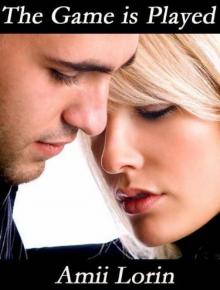 The Game Is Played
The Game Is Played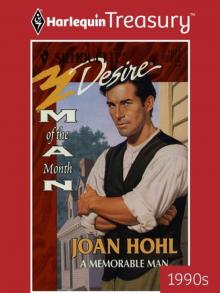 A Memorable Man
A Memorable Man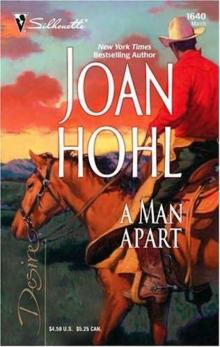 A Man Apart
A Man Apart While the Fire Rages
While the Fire Rages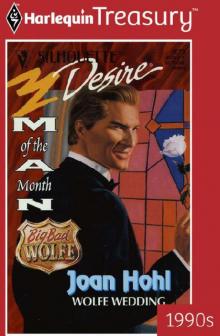 Wolfe Wedding
Wolfe Wedding In the Arms of the Rancher
In the Arms of the Rancher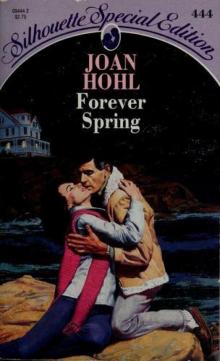 Forever Spring
Forever Spring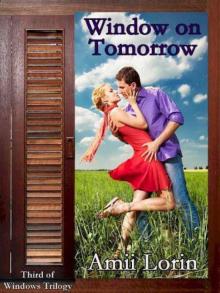 Window on Tomorrow
Window on Tomorrow The M.D.'s Mistress
The M.D.'s Mistress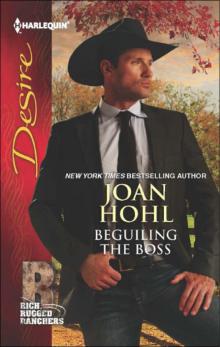 Beguiling the Boss
Beguiling the Boss Breeze off the Ocean
Breeze off the Ocean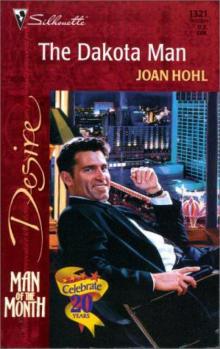 The Dakota Man
The Dakota Man Wolfe Wanting
Wolfe Wanting Falcon's Flight
Falcon's Flight Power and Seduction
Power and Seduction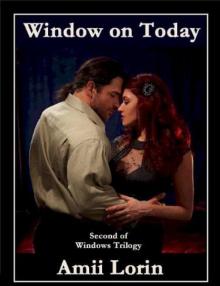 Window on Today
Window on Today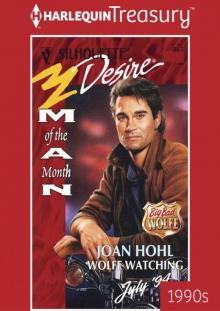 Wolfe Watching
Wolfe Watching